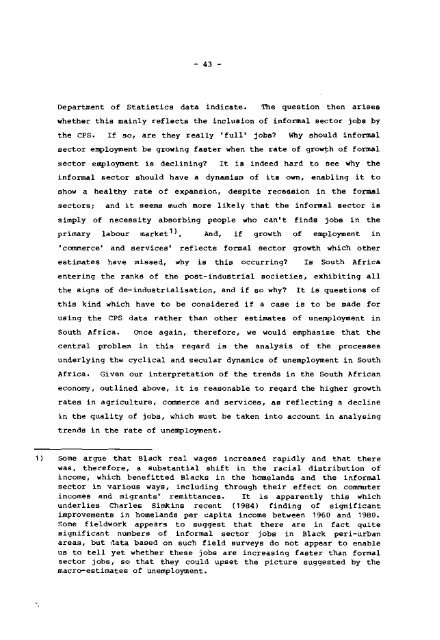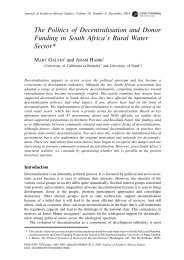Bell, Trevor : Unemployment in South Africa
Bell, Trevor : Unemployment in South Africa
Bell, Trevor : Unemployment in South Africa
Create successful ePaper yourself
Turn your PDF publications into a flip-book with our unique Google optimized e-Paper software.
Department of Statistics data <strong>in</strong>dicate. The question then arises<br />
whether this ma<strong>in</strong>ly reflects the <strong>in</strong>clusion of <strong>in</strong>formal sector jobs by<br />
the CPS. If so, are they really 'full' jobs7 Why should <strong>in</strong>formal<br />
sector employment be grow<strong>in</strong>g faster when the rate of grovth of formal<br />
sector employment is decl<strong>in</strong><strong>in</strong>g? It is <strong>in</strong>deed hard to see why the<br />
<strong>in</strong>formal sector should have a dynamism of its om, enabl<strong>in</strong>g it to<br />
show a healthy rate of expansion. despite recession <strong>in</strong> the formal<br />
sectors; and it seems much more likely that the <strong>in</strong>formal sector is<br />
simply of necessity absorb<strong>in</strong>g people who can't f<strong>in</strong>ds jobs <strong>in</strong> the<br />
primary labour market1). And, if growth of employment <strong>in</strong><br />
'c-erce' and services' reflects formal sector grovth which other<br />
estimates have missed, why is this occurr<strong>in</strong>g7 Is <strong>South</strong> <strong>Africa</strong><br />
enter<strong>in</strong>g the ranks of the post-<strong>in</strong>dustrial societies, exhibit<strong>in</strong>g all<br />
the signs of de-<strong>in</strong>dustrialisation. and if so why7 It is questions of<br />
this k<strong>in</strong>d which have to be considered if a case is to be made for<br />
us<strong>in</strong>g the CPS data rather than other estimates of unemployment <strong>in</strong><br />
<strong>South</strong> <strong>Africa</strong>. Once aga<strong>in</strong>, therefore, we would emphasize that the<br />
central problem <strong>in</strong> this regard is the analysis of the processes<br />
underly<strong>in</strong>g the cyclical and secular dynamic- of unemployment <strong>in</strong> <strong>South</strong><br />
<strong>Africa</strong>. Given our <strong>in</strong>terpretation of the trends <strong>in</strong> the <strong>South</strong> <strong>Africa</strong>n<br />
economy, outl<strong>in</strong>ed above, it is reasonable to regard the higher growth<br />
rates <strong>in</strong> agriculture, commerce and services, as reflect<strong>in</strong>g a decl<strong>in</strong>e<br />
<strong>in</strong> the quality of jobs. which must be taken <strong>in</strong>to account <strong>in</strong> analys<strong>in</strong>g<br />
trends <strong>in</strong> the rate of unemployment.<br />
1) %me argue that Black real wages <strong>in</strong>creased rapidly and that there<br />
was, therefore, a substantial shift <strong>in</strong> the racial distribution of<br />
<strong>in</strong>come, which henefitted Blacks <strong>in</strong> the homelands and the <strong>in</strong>formal<br />
sector <strong>in</strong> various ways, <strong>in</strong>clud<strong>in</strong>g through their effect on commuter<br />
<strong>in</strong>comes and migrants' remittances. It is apparently this which<br />
underlies Charles Simk<strong>in</strong>s recent (1984) f<strong>in</strong>d<strong>in</strong>g of significant<br />
improvements <strong>in</strong> homelands per capita <strong>in</strong>come between 1960 and 1980.<br />
some fieldwork appears to suggest that there are <strong>in</strong> fact quite<br />
significant numbers of <strong>in</strong>formal sector jobs <strong>in</strong> Black peri-urban<br />
areas, but data based on such field surveys do not appear to enable<br />
us to tell yet whether these jobs are <strong>in</strong>creas<strong>in</strong>g faster than formal<br />
sector jobs, so that they could upset the picture suggested by the<br />
macrc-estimates of unemployment.

















